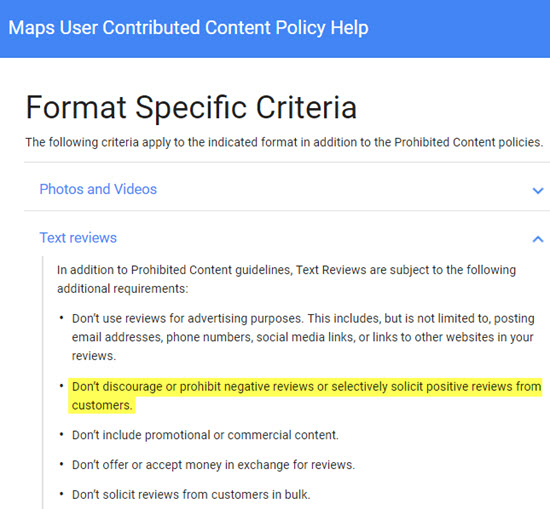Google recently added the following to their seldom-enforced list of preferences policies on Google Maps reviews:
“Don’t discourage or prohibit negative reviews or selectively solicit positive reviews from customers.”
The basic meaning seems clear enough: Google doesn’t want you to cherry-pick reviews. Fine. Got it.
But what’s Google’s definition of “discouraging or prohibiting” a negative review or “selectively soliciting” a positive review? Have you done either of those things without realizing it? Is Google only trying to scare the serious offenders and put everyone else (like you) on alert?
Joy Hawkins did a helpful post about Google’s “review-gating” policy. Here is her take on what Google now tells us not to do:
“Review-gating is the process of filtering candidates before asking them to leave you a review. Normally this is done by sending all customers an email template and first asking them if they had a positive or negative experience. If they had a positive experience, they are asked to leave a review on Google but if they had a negative experience, they are prompted to leave private feedback and are never sent the option to leave a review publicly.”
Google doesn’t call it “review-gating,” or specifically mention customer-outreach tools, but I’d say Joy’s conclusion is solid, and good advice to heed.
The only trouble is other review-encouragement practices may or may not be in the crosshairs of Google’s new policy. You can interpret “don’t discourage or prohibit negative reviews or selectively solicit positive reviews from customers” in a few other ways. You could hamstring your effort on reviews unnecessarily, or you could do something Google doesn’t want you to.

Here’s probably the loosest way to read Google’s new “rule”:
Interpretation 1: “We don’t care if you only approach happy-ish customers for Google reviews, and we don’t even care exactly how you ask, just as long as you constantly make it clear that customers can leave you a negative review if they feel the need.”
A more-specific reading:
Interpretation 2: “We don’t care whom you ask for Google reviews, but you’d better not fixate on their star ratings or what they say in the reviews. So that means don’t be like the hotel that fined guests for leaving bad reviews, don’t tell customers things like, ‘If we haven’t earned your 5-star review yet, please contact us first’, and don’t use review funnels.”
Here’s the harshest interpretation of it:
Interpretation 3: “Ask all customers for reviews, or ask none at all. Don’t let your knowledge of a customer’s happiness influence whether you ask him or her for a review. If you do ask for a review, pretend there’s no such thing as a ‘negative’ review, a ‘positive’ review, or star ratings.”
Here’s what I think Google means:
Interpretation 4: “We’re obligated to tell you that you shouldn’t ‘selectively solicit’ or ‘discourage or prohibit’ reviews. We’re smart enough to define those terms more clearly for you, but we’d rather leave it open to interpretation. That’ll deter some people, and it’ll spook software makers into enforcing our policies for us, and it lets us change our definitions however we want.”
Google long has left its review guidelines and other guidelines mushy (or obscure), apparently by design. Google’s policies, enforcement SOPs, and internal politics change all the time. Why wouldn’t they keep their options open?
For many years I’ve urged clients and others not to put words in customers’ mouths, not to fixate on 5 stars, and always to seek honest feedback. It’s possible to try too hard to avoid bad reviews. In doing so you miss out on many of the benefits of reviews in general.
But if you learn customers have gripes, it’s only reasonable to try to work out any problems first. That’s what they hope and expect you’ll do. They know full well that they can leave you a bad review at any time. I suspect the Google Maps powers-that-be would agree, but on the off-chance they don’t, let’s see them try to do something about it. As David Baxter said over at the Local Search Forum, “It’s about deterrence.”
—
How do you interpret Google’s latest mushy “policy” language?
Does it change your strategy in any way?
Any possible readings I missed?
Leave a comment!

Great post, Phil. I certainly agree with your interpretation #4. I think Google should start policing the insanely obvious review spam, before they worry about review-gating. Still, I understand their position (interpretation #3), and software makers should update their systems. We have made changes in the Whitespark Reputation Builder to comply with the updated guidelines.
Yeah, planning for #3 but knowing it’s #4 is probably wise. Reputation Builder is great either way!
Good points, Phil – and I agree with #4. To Darren’s point, policing the insanely obvious review spam would be a good place to start as well – like the personal injury attorneys in the local pack that have 148 5-star reviews. Or the troll that has no completed profile but leaves a 1-star review with no comments just to jack your average rating down. It is frustrating what Google allows to happen with reviews (even though their SEO algo is constantly rooting out “cheaters”). Facebook is asleep at the wheel too with reviews. We’ve reported dozens of bogus reviews and never once heard back from anyone at the big G.
It’s the Wild West, Toby. The unarmed sheriff takes siestas often.
So wouldn’t “capturing a customer’s Net Promoter Score” be considered Review Gating or has your website not been updated to reflect the changes?
As our attorney is fond of saying: “It’s all fun and games until you put it in writing”.
I like your attorney.
Phil,
I wish Google would put more attention on mitigating FAKE Reviews rather than adding more rules that businesses must follow. If they did that, maybe business owners wouldn’t be AS hung up on receiving bad reviews.
Even if they don’t hunt down the offenders, (which I think they could do with all of their data and processing power) I’d at least like to see them add some other flag responses; something like:
-Have never done business with this person
-Suspect Fake Profile
-Disgruntled Employee
-Probable Competitor
-etc.
I agree with . We’ve gotten fake reviews that are still there because we can’t remove them.
I hear ya Sharon, we deal with this every day. If the review does blatantly violate the guidelines, it stays. Sometimes, even those stay…
I hear you, Sharon. Removing fake reviews is tough in some cases and (for all practical purposes) impossible in the other cases.
Well-said, Rob. They’re going after jaywalkers and ignoring Jesse James.
I have had Google remove many Disgruntled Employee Reviews in the last 2 Months. for several of my clients. if you read deep in the new Bylaws there was a change. Now it was a Dog fight but in the end we got it done.
If you employ review-gating practices while simultaneously allowing them an option to leave the negative review on GMB directly – how would you characterize that? A violation or not at all?
I would not call that a violation in name or in practice, but it also depends on how it’s done. I’d want to see the email, or the page, or whatever you might use.
Of course, my take is not necessarily Google’s take.
Hi Phil,
I agree with Rob as well they flagging system is horrible!
On another note, we see with some of our clients that Google Local Guides will leave a rating but no reason for their rating. Its hard for a business to improve or make it right for a real negative review when they get a 1-star rating but with no reason whatsoever attached.
All Google has to do is impose a word counts or character count similar to what Yelp started doing a few years back and penalize the local guides are the gaming the system by faking their rating to access their next level of prizes.
It happening enough that we are using a canned response that we then customize to that reviewer that leaves a rating but no reason, but a BIG FAT blank space!
Great point Robert
I couldn’t agree more, Robert. Google should (1) require text in reviews and (2) require a minimum number of characters. Not that it would make the reviews any better, but that it would make the bogus reviews more obvious to readers and even more obvious to Google.
Yes, this has occurred to me as a ridiculously easy way to make fake reviews a little more obvious. It might also deter some of the fakers who may not be capable of stringing a sentence together or for whom it’s all too much like hard work …
OH. MY. #4 is so ridiculously accurate it’s not even funny. This made my day. Thanks for being awesome Phil!
Not sure I’m awesome, but you are, Joy!
As the saying goes, (and I don’t like it), “If you can’t convince, confuse! “
Phil,
The real story is that Google added that paragraph to make sure that the Consumer Protection Bodies around the World would not make them liable under a number of circumstances… When collecting and displaying reviews, Google is, just like any other review platform, considered as a Review Administrator and as such needs to comply with a set of international rules written in June 2016 by the ICPEN (International Consumer Protection and Enforcement Network).
ICPEN GUIDELINES FOR REVIEW ADMINISTRATORS:
https://www.icpen.org/sites/default/files/2017-06/ICPEN-ORE-Guidelines%20for%20Review%20Administrators-JUN2016.pdf
Page 7, you can read…
Review administrators should be guided by the following key principles:
be equal and fair in the collection of reviews (NO GATING)
be alert and proactive in the moderation of reviews
be transparent in the publication of reviews (NO FILTERING of negative reviews).
Along with the ISO 20488 standard on Online consumer reviews approved a few weeks ago and now just awaiting publication, we are just weeks away for those Consumer Protection Bodies to have a real Arsenal in their hand to regulate the Wild Wild West of the Online Reviews World. ISO 20488 is a beast in itself: order the document (very interesting read!) and you will see that a lot of things will have to change in the Online Reviews World.
https://www.iso.org/standard/68193.html
Do you think they are trying to encourage business owners to interact/reply more with their clients through their GMB replies? Just a thought..
Google seems to want replies, but I wouldn’t say this “policy” is an attempt to encourage replies.
I think this is a bit more serious than a guideline. This morning BirdEye announced that they will alter their software to prevent review gating.
Yes. Quality SEOs know that 90% of what Google says falls in category #4… Great post.
Requiring a minimum number of characters in a review would be very helpful. It’s the worst when a business gets a low star review with no way to fix it. Also 5 star reviews with no feedback don’t present any ways for the business to know what’s working.